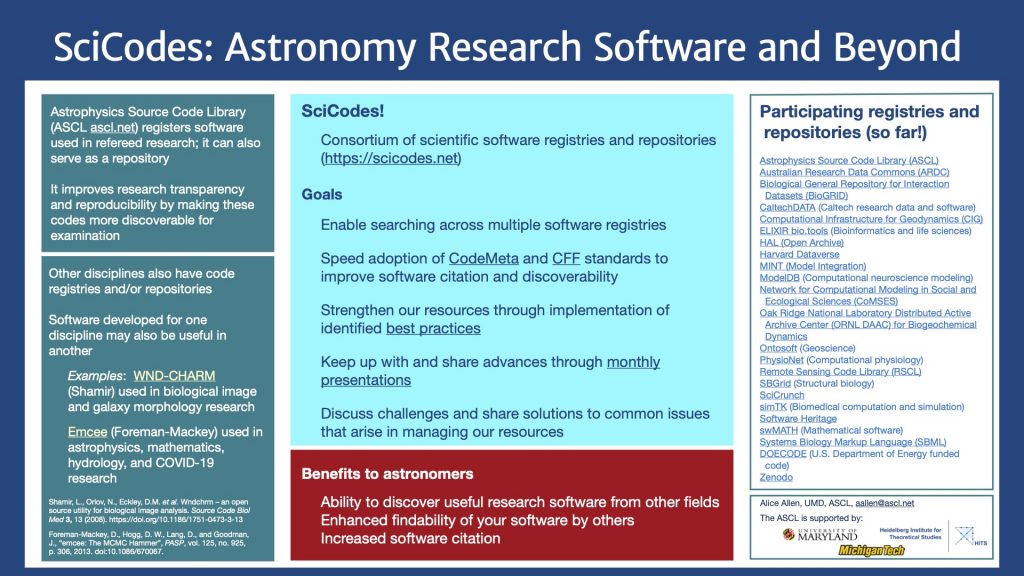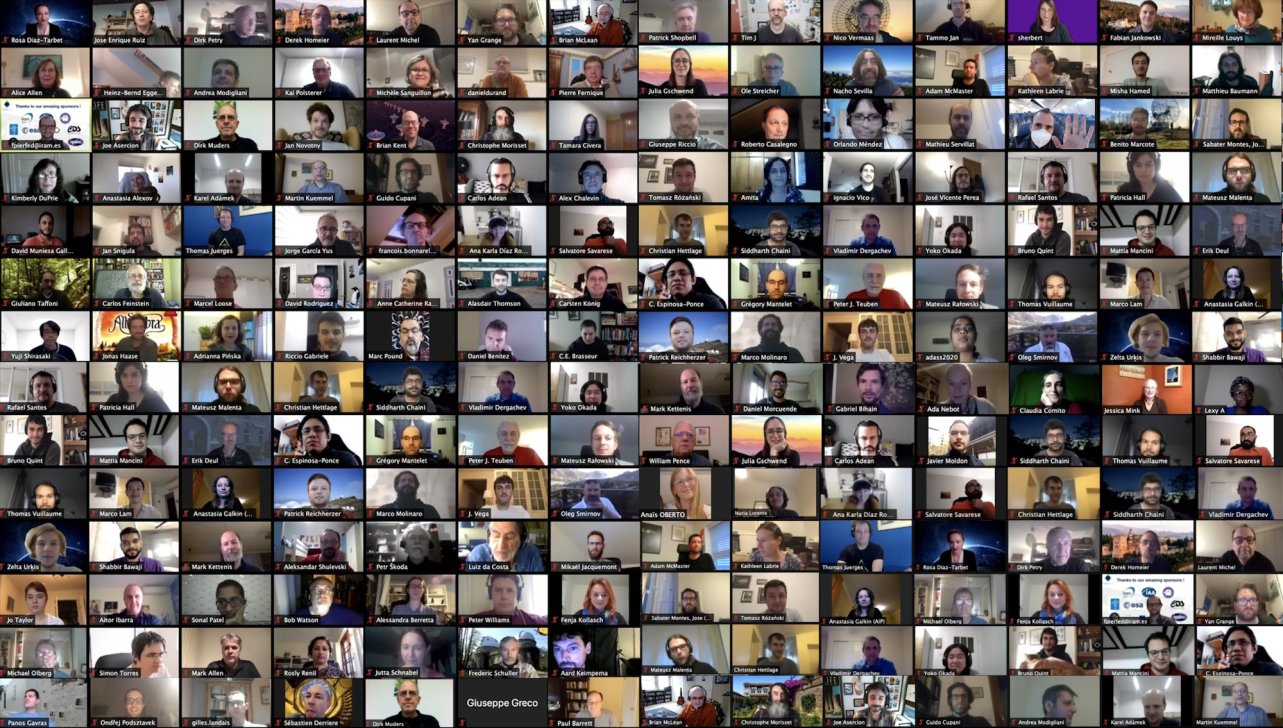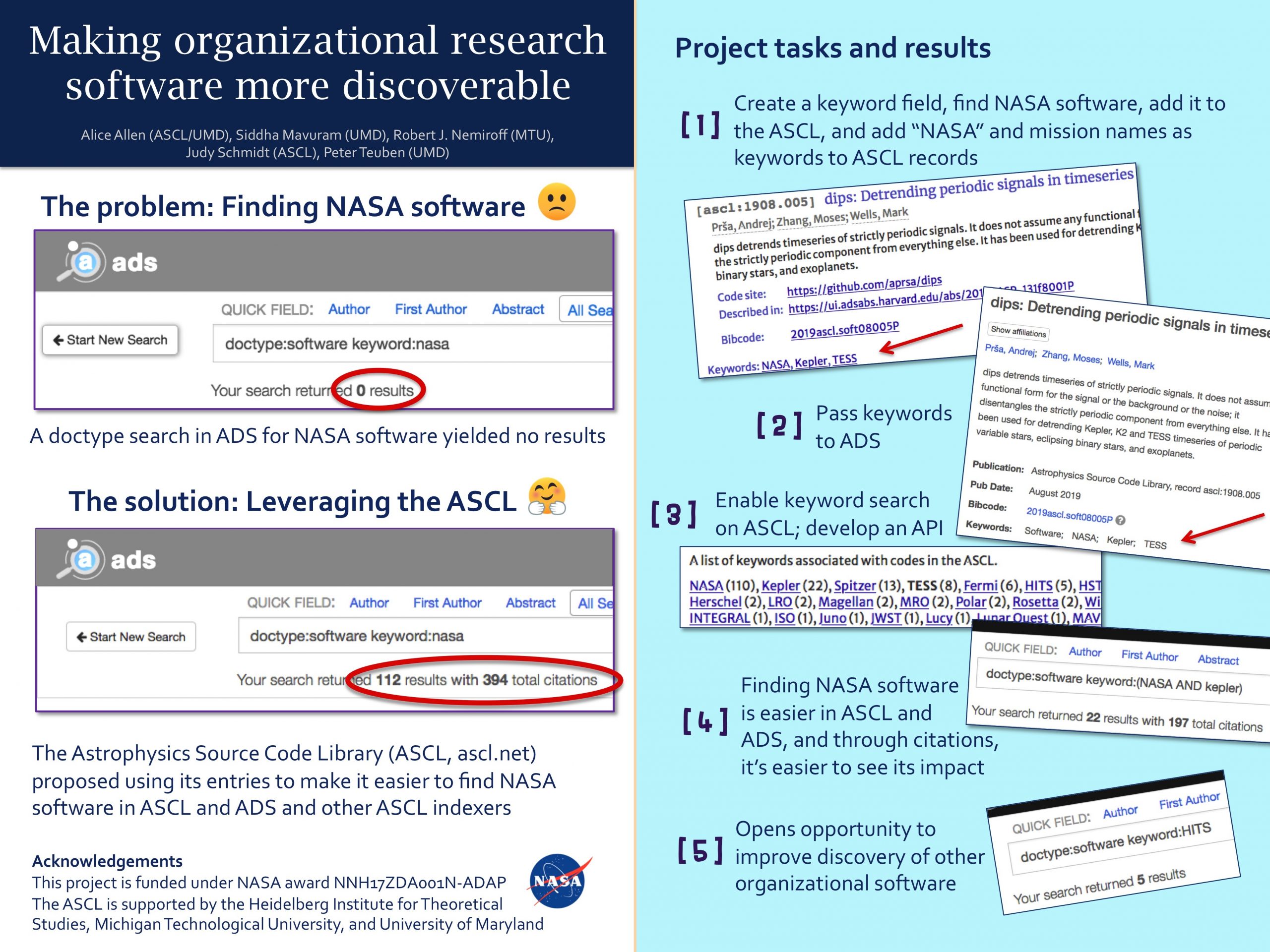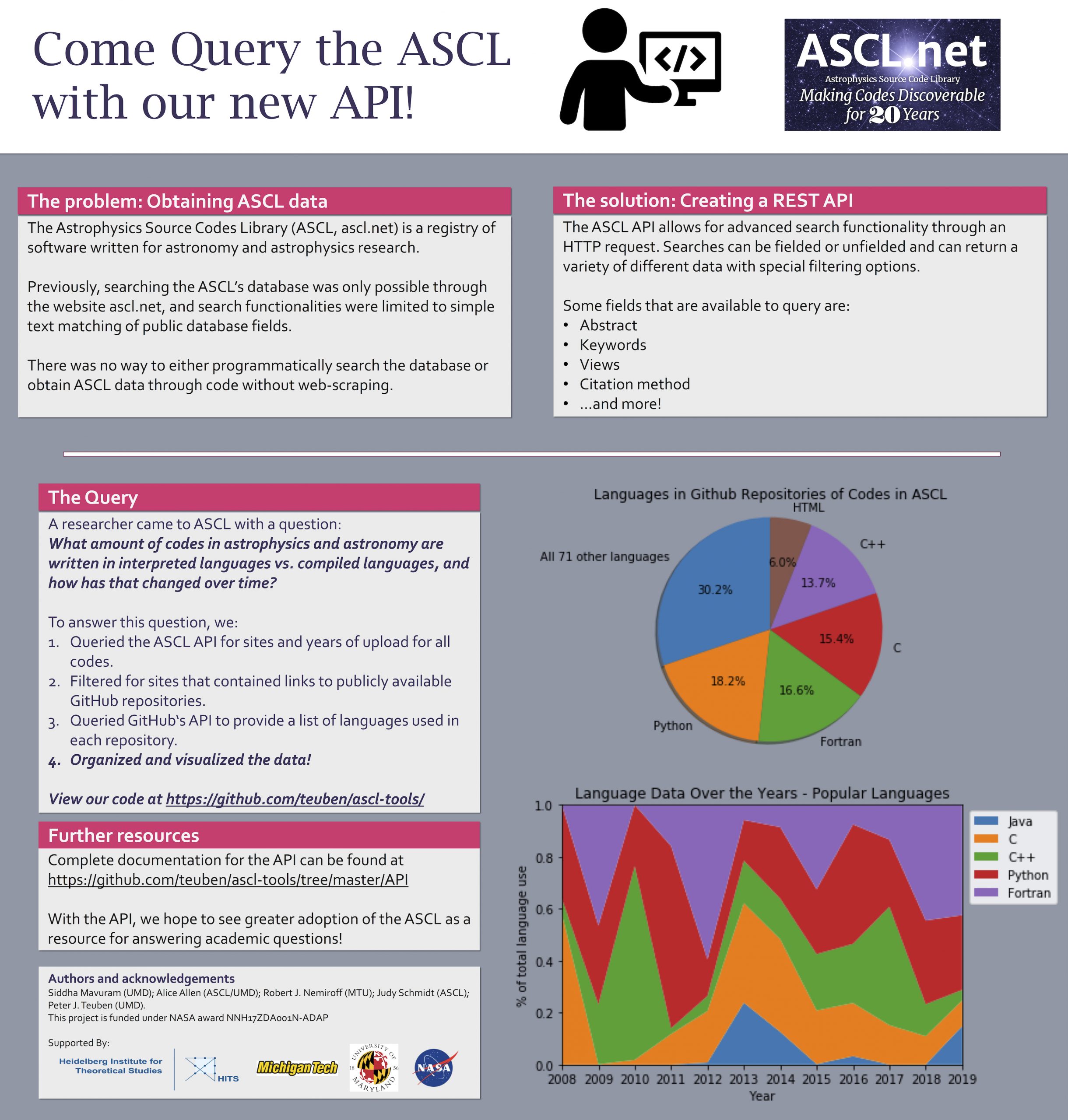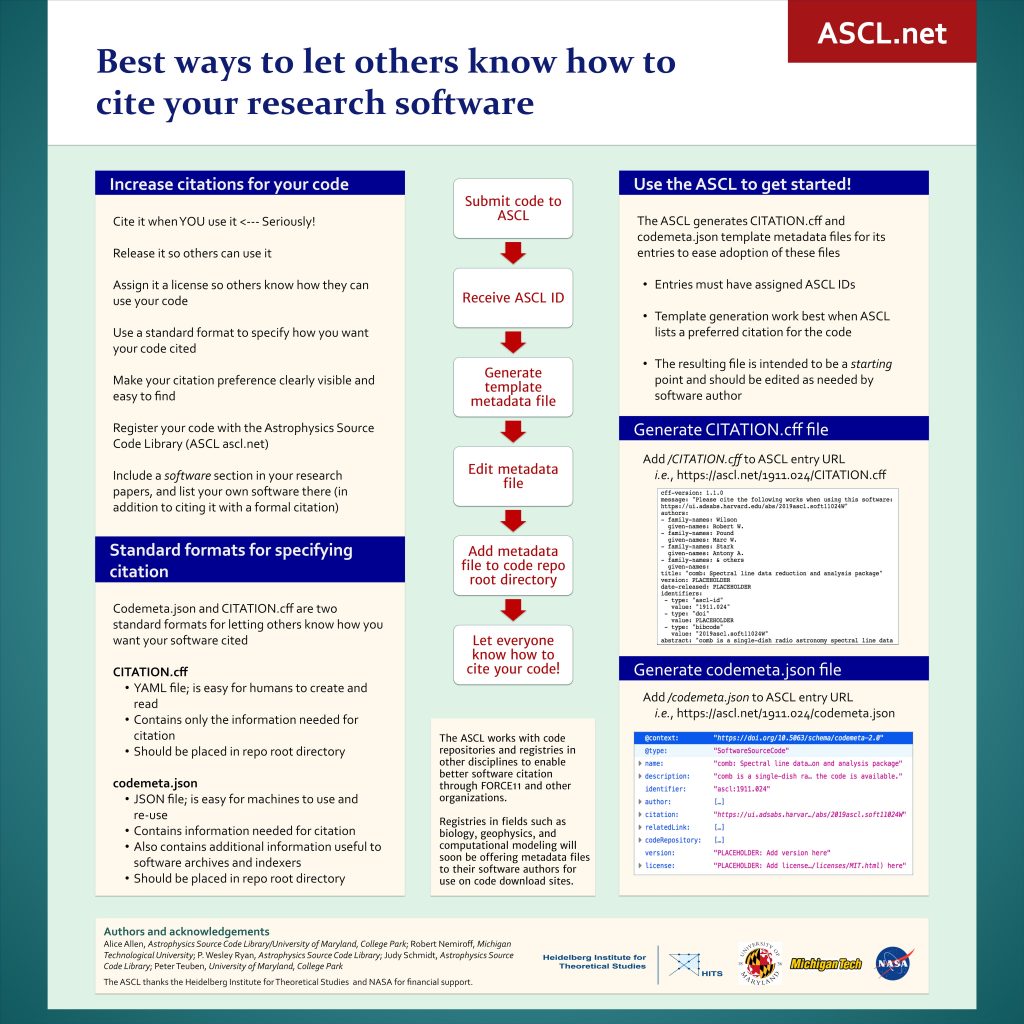Astronomical Data Analysis Software and Systems (ADASS), which was to have been in Granada, Spain this year, kicked off the fully online ADASS X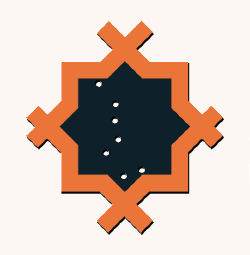 XX meeting yesterday with four tutorials, as is usually done, though not quite like it was done this year. The Programming Organizing Committee and especially the Local Organizing Committee had to convert a conference that had been two years in the planning to a virtual meeting. This offered numerous challenges and learning opportunities! One challenge is that the conference is international; scheduling sessions for access to all participants couldn’t have been easy, but with the technology stack they chose, which includes the conference website, Zoom, YouTube, and Discord, and hard work, all of ADASS’s resources are available to all participants. One might have to get up early or stay up late to hear all of the talks live — the sleep-deprived author of this post awoke at 12:15 AM today to catch the opening sessions — but there are asynchronous options available, so groggy stumbling as one makes her way to the computer is a choice, not a requirement.
XX meeting yesterday with four tutorials, as is usually done, though not quite like it was done this year. The Programming Organizing Committee and especially the Local Organizing Committee had to convert a conference that had been two years in the planning to a virtual meeting. This offered numerous challenges and learning opportunities! One challenge is that the conference is international; scheduling sessions for access to all participants couldn’t have been easy, but with the technology stack they chose, which includes the conference website, Zoom, YouTube, and Discord, and hard work, all of ADASS’s resources are available to all participants. One might have to get up early or stay up late to hear all of the talks live — the sleep-deprived author of this post awoke at 12:15 AM today to catch the opening sessions — but there are asynchronous options available, so groggy stumbling as one makes her way to the computer is a choice, not a requirement.
The ASCL has several presentations and activities this year. ASCL Chair Peter Teuben, ASCL Advisory Committee member Bruce Berriman, and I organized a Birds of a Feather (BoF) session on How to better describe software for discovery and citation today. We have organized BoFs focused on some aspect of software in the past, and, as in the past, this BoF offered a number of very short presentations and then open discussion.
The BoF session focused on software metadata, to improve how software is described and can be discovered and cited. After Teuben opened the session, Berriman presented his experience with using CiteAs to see how it suggested his software Montage be cited. 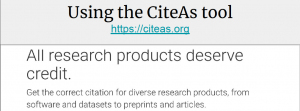 CiteAs uses numerous ways to find a code’s citation method, including looking for metadata files — specific files that contain metadata for the software — on the code’s website and/or GitHub repository. Montage does not currently have a metadata file on its sites, so the citation method CiteAs suggested was not as robust as it could have been. The results of the search and its provenance are shown in the BoF’s slides, which can be downloaded at a link below.
CiteAs uses numerous ways to find a code’s citation method, including looking for metadata files — specific files that contain metadata for the software — on the code’s website and/or GitHub repository. Montage does not currently have a metadata file on its sites, so the citation method CiteAs suggested was not as robust as it could have been. The results of the search and its provenance are shown in the BoF’s slides, which can be downloaded at a link below.
This led nicely into my short talk on metadata files and how the ASCL can create a metadata file from an ASCL entry. 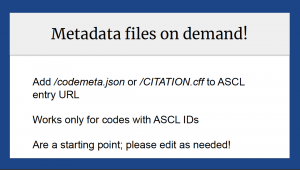 The files the ASCL creates programmatically, codemeta.json and CITATION.cff, are intended to be starting points and contain placeholders for data the ASCL does not capture, but which we feel should be included in the metadata file; we encourage software authors to edit these files before they are placed on one’s code site.
The files the ASCL creates programmatically, codemeta.json and CITATION.cff, are intended to be starting points and contain placeholders for data the ASCL does not capture, but which we feel should be included in the metadata file; we encourage software authors to edit these files before they are placed on one’s code site.
Yan Grange, who had organized an earlier BoF on Best licensing practices, presented a summary of the session and the results of two of the several polls taken during that BoF. 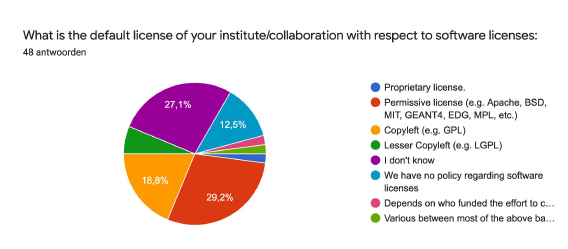 Providing a license for your software is vitally important, as it lets others know what they can and cannot do with your software. Resources and other information from the earlier BoF are available online, and Grange’s summary slides for our software metadata BoF are included in the slides file below.
Providing a license for your software is vitally important, as it lets others know what they can and cannot do with your software. Resources and other information from the earlier BoF are available online, and Grange’s summary slides for our software metadata BoF are included in the slides file below.
Teuben presented on several related topics: expanding or deepening a codemeta file with “API” information, the Unified Astronomy Thesaurus (UAT) and keywords, and the possibility of taking a software census at a niche science meeting. For this latter, he would like to take a well-defined field in astrophysics and have members of that community take an inventory of the software used and categorize it. 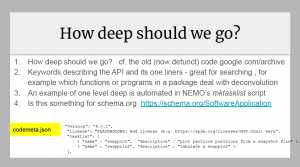 He thinks a conference would be an ideal event for getting all the stakeholders together, and has identified a possible candidate conference for this activity.
He thinks a conference would be an ideal event for getting all the stakeholders together, and has identified a possible candidate conference for this activity.
The floor, if there can be a floor in a virtual meeting, was then open for comments, questions, answers and ideas, though discussion had already started in the Discord channel. One outcome of this session was that before the end of it, several participants had added metadata files to code repositories!
All slides for this session are in the PDF file below. If you would like more information about the session, please let us know in the comments section below, pinging us at ADASS if you are participating in the meeting, or by emailing me at editor@ascl.net.
Slides (PDF)
